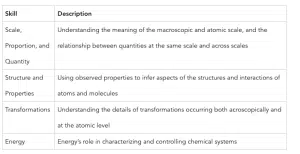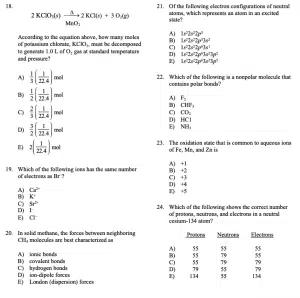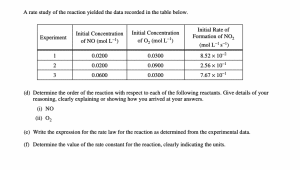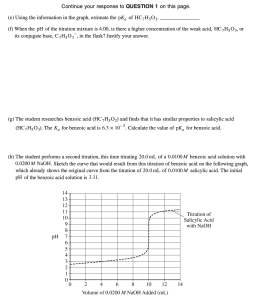The Ultimate Guide to Acing the AP Chemistry Exam
For students looking to challenge themselves during their high school years and have a college application that will gain them acceptance to some of the most prestigious colleges and universities in the United States, enrolling in AP exams is considered a must-do. As far as AP exams go, the AP Chemistry Exam is one of the most common for students who are either enrolled in the course or self-study at home. Last year, approximately 150,000 students took the AP Chemistry Exam.
What is the AP Chemistry Exam?
The AP Chemistry Exam is a standardized test administered by the College Board that allows high school students to earn college credit for chemistry coursework. It is designed to assess students’ understanding of fundamental concepts and skills in chemistry. The exam consists of both multiple-choice and free-response questions, which test your knowledge of topics covered in a typical college-level introductory chemistry course.
If you are thinking about taking the AP Chemistry Exam, let us at AdmissionSight help break down everything that you will need to know about the exam. That includes the content you will cover in the course, the information you will be expected to master to score a top grade in the exam, and finally, the best studying practices that you can take advantage of to improve your chances at success.
When it comes to your chances at success from a statistical standpoint, the AP Chemistry Exam is considered a pretty difficult one to master and score a perfect 5 out of 5 on. While many students last year passed the exam, scoring at least a 3 out of 5, just over 10 percent achieved a perfect 5.
If you are taking the AP Chemistry Exam specifically to try to earn credit at the university or college of your dreams, remember that the amount of credit and advanced standing a student receives depends entirely on the college itself. While the 3 out of 5 scores are enough to pass, it is not necessarily enough to receive credit or placement. Still, a passing grade on an AP Exam will look great on a college application transcript.
That said, here is the breakdown of scores from last year’s AP Chemistry Exam.

About the AP Chemistry Course
When it comes to students enrolling in the corresponding AP Chemistry course, they can expect to tackle nine total units throughout the class that the College Board has developed.
When it comes to any prerequisites that students must accomplish before signing up for AP Chemistry, there are two. To sign up for the course, students must have passed and completed Algebra II and a general high school chemistry course. If you have not taken these classes before enrolling in the course at school or starting your self-study for the AP Chemistry Exam, chances are good that you will quickly find that you do not have the information necessary to succeed. Of course, a general strength in both science and math subjects is encouraged.
On top of that, here is the breakdown of how these units will show up and be tested on the actual exam:


Throughout the class, students will be taught and tested on these subjects to prepare them as best as possible for the coming exam.
If students are studying at home, they will want to purchase the coursebook and go through it on their own or in a study group, as if they were receiving an in-school grade for it. If students do not prepare for the AP Chemistry Exam correctly, there is a significant chance that they will not get the score they hoped for.
What is on the AP Chemistry Exam?
Overall, the AP Chemistry Exam is focused on developing a student’s advanced inquiry and reasoning skills. Because the base of scientific knowledge is rapidly evolving and changing, the emphasis is not put on specific content and facts regarding chemistry. Instead, the focus is put on teaching students how to master the lasting conceptual understanding within the field of chemistry. This includes exciting skills such as developing plans for data collection, analysis of data, application of mathematical routines, as well as building connections between concepts across different fields and domains.
In the AP Chemistry Exam, students will undertake two main components. These are known as Scientific practices and Course content. Scientific practices are the skills necessary to think and behave like a real chemist, while course content covers the general and abstract concepts or themes that are the very foundation of the course.
Course content is further broken down from there into “Big Ideas.”
Here are the six different scientific practices that are included in the AP Chemistry Exam:
| Skill | Description | Exam Weighting (Multiple-Choice Section) | Exam Weighting (Free-Response Section) |
| 1. Models and Representations | Describe models and representations, including across scales. | 8%–12% | 2%–4% |
| 2. Question and Method | Determine scientific questions and methods. | 8%–12% | 10%–16% |
| 3. Representing Data and Phenomena | Create representations or models of chemical phenomena. | Not assessed in the multiple-choice section. | 8%–16% |
| 4. Model Analysis | Analyze and interpret models and representations on a single scale or across multiple scales. | 23%–30% | 5%–9% |
| 5. Mathematical Routines | Solve problems using mathematical relationships. | 35%–42% | 43%–53% |
| 6. Argumentation | Develop an explanation or scientific argument. | 8%–12% | 15%–24% |
Here are the four big ideas that are covered in the AP Chemistry Exam:

Exam format and content
As previously mentioned, the AP Chemistry course is broken into nine separate units. All of the questions that students face on the exam itself derive from those units, and the weight that each unit receives regarding the final score of the exam is below:
| Unit | Exam Weighting (Multiple-Choice Section) |
| Unit 1: Atomic Structure and Properties | 7%–9% |
| Unit 2: Molecular and Ionic Compound Structure and Properties | 7%–9% |
| Unit 3: Intermolecular Forces and Properties | 18%–22% |
| Unit 4: Chemical Reactions | 7%–9% |
| Unit 5: Kinetics | 7%–9% |
| Unit 6: Thermodynamics | 7%–9% |
| Unit 7: Equilibrium | 7%–9% |
| Unit 8: Acids and Bases | 11%–15% |
| Unit 9: Applications of Thermodynamics | 7%–9% |
All of these nine topics will be covered on the AP Chemistry Exam. The exam is one of the longer AP exams that high school students and clocks in at three hours and 15 minutes total. That time is broken up into two sections: the multiple-choice section and free-response questions.
Let us at AdmissionSight break down the kinds of questions that you can expect to face when you sit down for the exam on the day.
Multiple choice
The first section students will tackle in the AP Chemistry Exam is a 60-question multiple-choice section. In this section, questions will both come as stand-alone and grouped questions. To score high marks in this section, students will have to be able to do the following:
- Explain, analyze, and understand models and representations of chemical properties and phenomena
- Design and understand experiments and procedures to test a prediction or scientific theory
- Use mathematical relationships to solve a problem
- Take advantage of evidence and reasoning to make or justify a scientific claim and support that claim
Here are several examples of multiple-choice questions that students can expect to see on the exam.




Free Response
The multiple-choice section of the exam is divided into three long essays, each worth 10 points, and four separate short-response answers worth four points.
In the free-response section of the exam, students will be given one hour and 45 minutes to complete. It is up to every student to effectively budget their time on this section, as the proctor in the room will remind you of the amount of time that is remaining, but they will not force you to move on to the next question at any time.
Some examples of the free-response questions that you may face include the following:




One thing to remember is that when you are preparing for the AP Chemistry Exam, and as you take the exam itself, you will be allowed and encouraged to use a scientific calculator for the free-response section only. You will also be provided with an equation and formula list and a copy of the entire periodic table that you can use.
If you are interested in the official rules and guidelines regarding calculator use on the exam, here is a link to the College Board’s calculator policy. Beyond that, here is a way to find which equations and formulas you will be provided on the day of the exam as well.
How to study for the AP Chemistry Exam
Now that we at AdmissionSight have broken down what subject matter you will be expected to master to ace the AP Chemistry exam let’s quickly go over the best way to prepare and practice.
- Review the Course Content: Familiarize yourself with the topics covered in the AP Chemistry course. List critical concepts and create a study schedule to allocate time for each topic.
- Use Reliable Study Resources: Utilize textbooks, study guides, and online resources specifically designed for AP Chemistry preparation. These resources often include practice questions and exams that simulate the exam experience.
- Practice: Regular practice is essential to reinforce understanding of concepts and hone problem-solving skills. Solve various practice questions and past AP Chemistry Exam papers to familiarize yourself with the question types and develop effective strategies.
- Collaborate with Peers: Form study groups with classmates or seek help from your teacher or chemistry tutor. Discussing concepts and solving problems can enhance your understanding and provide different perspectives.
- Seek Clarification: If you encounter difficulties or have questions, don’t hesitate to seek clarification from your teacher or classmates. Understanding the concepts entirely is crucial for success on the exam.
When reviewing the course content, it’s essential to go beyond just reading the material. Take the time to engage with the information actively. This could involve creating flashcards to help you memorize key terms and definitions or making concept maps to visualize the relationships between different topics.
In addition to textbooks and study guides, consider using online resources such as educational websites, YouTube channels, and online forums. These platforms often offer explanations and examples that can supplement your understanding of complex topics.
When practicing, aim for a balance between quantity and quality. It’s not enough to complete a large number of practice questions. Take the time to analyze your mistakes and understand why you got them wrong. This will help you identify any knowledge gaps and improve your problem-solving skills.
Study groups can be a valuable resource for discussing challenging concepts and sharing study strategies. Each member can bring unique insights and perspectives, which can deepen your understanding of the material. Additionally, teaching others can be an effective way to reinforce your knowledge.
Don’t be afraid to ask for help when you need it. Your teacher or chemistry tutor can provide clarification on confusing topics and offer guidance on how to approach complex problems. Remember, seeking clarification is a sign of strength, not weakness.
How hard is the AP Chemistry Exam?
The difficulty level of the AP Chemistry Exam can vary depending on your preparation and familiarity with the course content. Many students find it challenging due to the breadth of topics covered and the analytical thinking required to solve problems. However, with proper study habits and a solid understanding of the material, achieving a high score is attainable. Remember to allocate sufficient time for studying, practice regularly, and seek assistance when needed to overcome any challenges you may face.
One of the reasons why the AP Chemistry Exam can be considered difficult is the extensive range of topics that it covers. From atomic structure to chemical reactions, from thermodynamics to equilibrium, and from kinetics to organic chemistry, the exam requires a comprehensive understanding of all these concepts. Students must dedicate a significant amount of time to studying and reviewing the material.

Furthermore, the exam also demands strong analytical thinking skills. It is not enough to memorize facts and formulas; students must be able to apply their knowledge to solve complex problems. This requires the ability to analyze experimental data, make connections between different concepts, and think critically to arrive at the correct answer.
Another aspect that adds to the difficulty of the AP Chemistry Exam is the time constraint. The exam consists of multiple-choice and free-response questions, and students are expected to complete all sections within a limited time. This means that not only do students need to have a deep understanding of the material, but they also need to be able to work efficiently and manage their time effectively during the exam.
However, it is essential to note that while the AP Chemistry Exam may be challenging, it is not impossible to do well. With proper preparation and study strategies, students can overcome difficulties and achieve a high score. It is recommended to start studying early, create a schedule, and review the material consistently. Practice exams and sample questions can also help familiarize yourself with the exam format and identify areas that need improvement.
Additionally, seeking assistance when needed can make a significant difference in your understanding and performance. Whether asking your teacher for clarification, attending review sessions, or joining study groups, reaching out for help can provide valuable support and guidance throughout your preparation for the exam.
In conclusion, while the AP Chemistry Exam may be challenging, it is vital to approach it with a positive mindset and a strong work ethic. With dedication, perseverance, and the proper study strategies, you can overcome the difficulties and succeed on the exam. Stay organized, manage your time effectively, and seek assistance when needed. Good luck!
When is the AP Chemistry Exam in 2024?
The AP Chemistry Exam is typically scheduled for early May each year. For 2024, the AP Chemistry Exam is scheduled for May 6th. It is essential to stay updated with the College Board’s website or consult your school’s AP coordinator for the exact date of the AP Chemistry Exam in 2024.
Below is the complete schedule for the AP examinations of 2024:
| Week 1 | Morning 8 a.m.
Local Time |
Afternoon 12 p.m.
Local Time |
||||||||||||||||||||||||
| Monday,
May 6, 2024 |
United States Government and Politics | Art History
Chemistry |
||||||||||||||||||||||||
| Tuesday,
May 7, 2024 |
Human Geography
Microeconomics |
Seminar
Statistics |
||||||||||||||||||||||||
| Wednesday,
May 8, 2024 |
English Literature and Composition | Comparative Government and Politics
Computer Science A |
||||||||||||||||||||||||
| Thursday,
May 9, 2024 |
Chinese Language and Culture
Environmental Science |
Psychology | ||||||||||||||||||||||||
| Friday,
May 10, 2024 |
European History
United States History |
Macroeconomics
Spanish Literature and Culture |
||||||||||||||||||||||||
Art and Design: Friday, May 10, 2024 (8 p.m. ET), is the deadline for AP Art and Design students to submit their three portfolio components as final in the AP Digital Portfolio.
|
||||||||||||||||||||||||||
How long is the AP Chemistry Exam?
The AP Chemistry Exam is approximately three hours and 15 minutes long. The exam should take 1 hour and 30 minutes for the multiple-choice section and 1 hour and 45 minutes for the free-response section. This duration includes a 15-minute reading period at the beginning of the exam, during which you can read the exam questions and plan your answers. It is crucial to manage your time effectively during the exam to ensure sufficient time to complete the multiple-choice and free-response sections.
When do AP scores come out?
AP scores for the Chemistry Exam are typically released in early July. The exact date can vary slightly each year, so it is essential to check the College Board website or your College Board account for the specific score release date. Once the scores are released, you can access them online and see how you performed on the exam.
Preparing for the AP Chemistry Exam requires dedication, consistent practice, and a solid understanding of the course content. By following the tips in this ultimate guide, you can equip yourself with the necessary tools and knowledge to excel on the exam and achieve a high score. Stay focused, manage your time effectively, and seek assistance when needed. With hard work and determination, you can ace the AP Chemistry Exam and set yourself up for success in your academic and future endeavors.
If you want to discuss the matter to a greater extent or inquire about college admissions, look no further! Our experts here at AdmissionSight can help you! Here at AdmissionSight, we have over a decade’s worth of experience guiding students through the competitive admissions process to get accepted to the top universities in the world. Feel free to set up an appointment today to book your initial consultation.





































